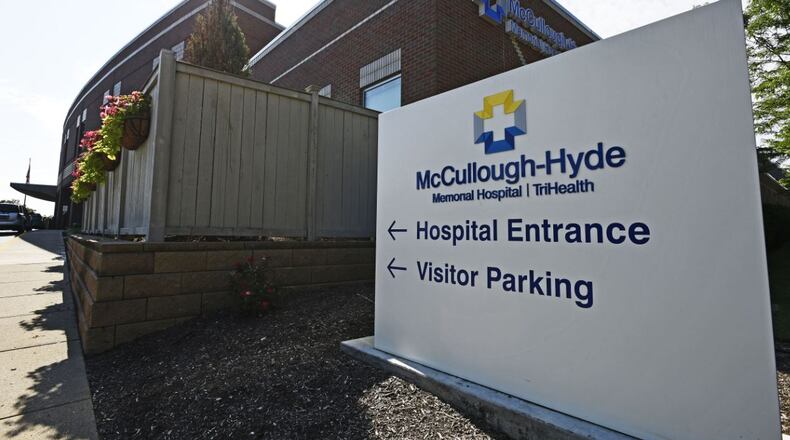“We’re safe and ready,” he said. “Our mission is to make the people of the community safer.”
While rumors have floated around the community that they are transferring patients out of the local hospital for various supposed reasons, Everett said McCullough-Hyde has served 389 COVID patients and had a transfer rate of 7.8 percent. He explained the TriHealth system offers sufficient beds to cover patient needs but transfers are due to patients — not just COVID —needing a higher level of care.
“The doctors have done a good job of finding what is needed,” Everett said, adding the hospital serves 14 counties and the Urgent Care office is serving people from all over the region. “The drive-thru COVID testing is reaching 400 and will expand.”
In answer to a question later in the presentation, Everett said the community is fortunate to have the TriHealth network.
“We are much larger than McCullough-Hyde. Within the system, we are never out of beds. We have 3.8 days as the average stay. We’ve got the capacity within the system,” he said in answer to a question from Council Member David Prytherch about regional capacity. “If we get to the point where we are overloaded, we look at two or three different things, for example elective surgeries. There is a whole system, a network, within TriHealth.”
In an interview this past Tuesday, he updated some of his comments, noting McCullough-Hyde had 11 COVID patients as of that morning, which was three more than he reported to Council a week earlier.
The Delta variant was driving the heaviest hospital use through December and early January, but by Tuesday, it was being rapidly replaced by Omicron.
“We’re seeing Omicron accelerating now in this part of the state. Cleveland is stable, but high. In early December, it was Delta, but by late December, Omicron was quickly overtaking it. It’s about two-thirds now,” Everett said Tuesday. Omicron is expected to peak in a few weeks. “We encourage people to take all precautions – masks and vaccination. We have seen the need for the booster.”
He told Council in January of last year, 88 percent were not fully vaccinated and currently, in the ICU, 80 percent not fully vaccinated. He said four patients who had died were not fully vaccinated.
He said six team members have been out with COVID and hospital precautions include requiring everyone to wear masks at all times inside and allowing only one visitor per patient. The hospital staff has been holding daily meetings with discussions about the current bed call to determine availability and have established a management command center.
At the Council meeting, Everett said the National Guard had been called up to assist hospitals with testing, but he was hesitant to ask for the help because they were able to deal with the situation and he is not sure what it would entail.
“The National Guard will want to set up for testing and we are not sure what that means. We are not ready to invite them in because they will want no elective surgeries,” Everett told Council.
On Tuesday, he clarified the term “elective surgery” is misleading because it could be taken to mean nonessential but patients needing a variety of surgeries want and need them soon.
“Everything needs to take place. People do not want delay,” he said Tuesday.
He praised the hospital staff, calling them “the real heroes.”
“They are the marathoners, not sprinters,” he said.
He also told Council he thanks the McCullough-Hyde Foundation for providing additional funding for equipment needs and medicines during the COVID pandemic to help the team provide the care they do.
About the Author
